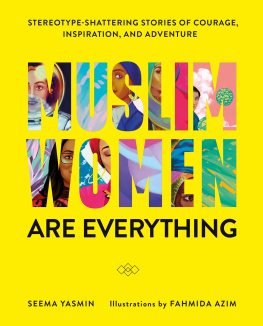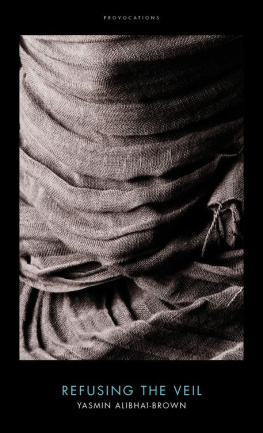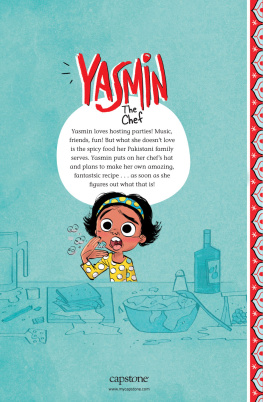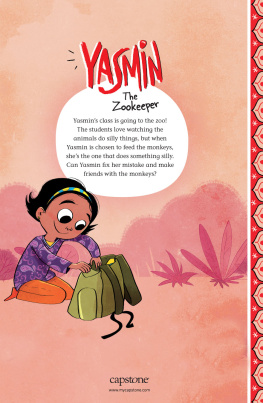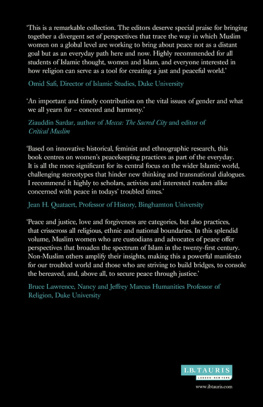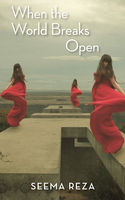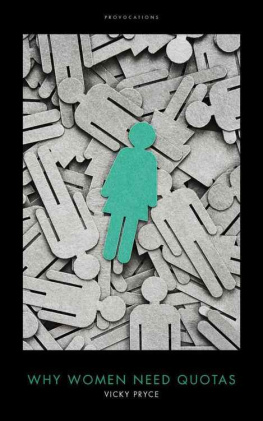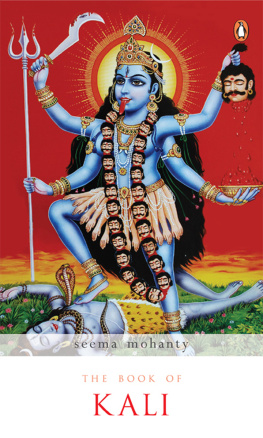Seema Yasmin - Muslim Women Are Everything
Here you can read online Seema Yasmin - Muslim Women Are Everything full text of the book (entire story) in english for free. Download pdf and epub, get meaning, cover and reviews about this ebook. year: 2020, publisher: HarperCollins, genre: Non-fiction. Description of the work, (preface) as well as reviews are available. Best literature library LitArk.com created for fans of good reading and offers a wide selection of genres:
Romance novel
Science fiction
Adventure
Detective
Science
History
Home and family
Prose
Art
Politics
Computer
Non-fiction
Religion
Business
Children
Humor
Choose a favorite category and find really read worthwhile books. Enjoy immersion in the world of imagination, feel the emotions of the characters or learn something new for yourself, make an fascinating discovery.
- Book:Muslim Women Are Everything
- Author:
- Publisher:HarperCollins
- Genre:
- Year:2020
- Rating:4 / 5
- Favourites:Add to favourites
- Your mark:
- 80
- 1
- 2
- 3
- 4
- 5
Muslim Women Are Everything: summary, description and annotation
We offer to read an annotation, description, summary or preface (depends on what the author of the book "Muslim Women Are Everything" wrote himself). If you haven't found the necessary information about the book — write in the comments, we will try to find it.
Muslim Women Are Everything — read online for free the complete book (whole text) full work
Below is the text of the book, divided by pages. System saving the place of the last page read, allows you to conveniently read the book "Muslim Women Are Everything" online for free, without having to search again every time where you left off. Put a bookmark, and you can go to the page where you finished reading at any time.
Font size:
Interval:
Bookmark:
For Yasmin Halimamother of dreams and me,
the bravest, wittiest, most creative woman I know
Contents
I HAVE WANTED to write this book since I was fourteen, the year I finally understood that Muslim women are everything. I had felt it even earlier, born as I was to a Muslim woman who cooked and cleaned and surreptitiously read books, who taught me how to read Arabic and dance to Motown jams, a woman who raised me alone even though a man was in the house. When I was still young, she left that man to go to university, an act that required an incredible amount of courage and was such a rarity in our Indian Muslim community in 1980s England that she was cast out by our family and chastised by the women for having the gall to divorce a bad situation. Muslim women are complicated.
After that, I was raised on and off by my aunt, a veiled woman who tagged a sixth daily prayer onto the mandatory five, who woke in the dead of night to chant holy salutations and went to work in a factory early in the morning, but not before oiling my hair, weaving it into tight braids, and preparing an elaborate meal for me and her three children. She would come home with smears of industrial oil along the sides of her fingers, ears still ringing, forever damaged by the oscillations of factory equipment. She would perform wudhu, heat up dinner, and fix broken things: cabinets, sofa legs, sewing machines. Then she would teach us how to fold samosas and fry okra, how to strip the walls of paint and mix wallpaper glue in big buckets, so we could make pretty the house she had bought alone. Muslim women are polymaths.
It was in my aunts living room that I made the decision to wear hijab. I was twelve and reaching the apex of my devoutness. I never missed a prayer. I sometimes fasted even when it wasnt Ramadan. I turned my head and said astagfirullah when frothy beer commercials interrupted an episode of Cheers. I wore a hijab to bed so that if I died in the night, I could still enter heaven. I begged my mum, unsuccessfully, to take me out of secular school and let me attend an Islamic one. Just as I was making sense of my Muslimness, solidifying the rules of engagement with my faith and ringing up countless celestial points with my near-constant dhikr, my Muslim world got turned upside down. At fourteen, I left the Muslim community that had raised me in the middle of England and went to live with my mum in London. I thought I had arrived in Hades.
For the first time, I met Muslim women from outside of my community, Muslim women who messed up my neat and tidy definitions of Muslim and woman. There were Muslim women who loved women, Muslim women who prayed in mosques and not in their homes, Muslim women who dressed like men. I repented for all of them. I met Muslim women who werent sure if they were Muslim, who said things like exploring and figuring it out. There were women who were culturally Muslim or of Islamic heritage, Muslim women who were Ismaili and Ahmadi and not sure to my stunned Sunni Hanafi self. I talked to Muslim women who ran businesses and Muslim women who owned dogs, Muslim women who said forests full of treesnot mosqueswere their sacred spaces. They disrupted and diversified my perspective and showed that Muslim women are not a monolith. Muslim women are Everything.
I have wanted to write this book since I was fourteen, but I began writing this book when I was thirty-four. Frustrated with the narrative surrounding Muslim womenone that, even when it purports to celebrate us, is surprised that we can do things: Wow! Look at this Muslim woman run a marathon! Wow! This one is riding a bike!I fired off a fed-up tweet:

The tweet became a prose poem, which was published in a newspaper. I had rejected the invitation to turn it into an essay, not wanting to read, let alone write, another We bleed just like you, weep just like you, let me prove my humanity to you article. The prose poem was titled Yes, Muslim Women Do Things, and it featured Muslim women doing incredible things. With illustrations by artist-extraordinaire Fahmida Azim, Yes, Muslim Women Do Things showed Muslim women reading books and taking naps. It talked of Muslim women performing open-heart surgery, rolling a cigarette, cursing a broken nail, digging salad out from between their teeth. Revolutionary.
Yes, Muslim Women Do Things struck a chord. I dont know if it was the eyebrow piercing on the Black khimar-wearing Muslimahs face or that the Muslim woman reading a book was wearing hijab, but readers responded passionately and in droves. Some loved it, others hated it, but it was clear that there are still many people who believe Muslim women are One Thing; that we should be This and say That. (It was probably the furious trolling of the haters that landed us lots of attention and this book deal. Jazakallah khair.) Personal opinions aside, its hard to ignore the facts: There are 1.8 billion Muslims on the planet in 2020 and, growing at a rate surpassing any other religion, we are estimated to number 3 billion by 2050. Soon, one in four humans will be Muslim, and half of them will identify as Muslim women. And Muslim women, with our higher education and employment rates compared to Muslim men, are leading the charge when it comes to the progression of our Ummah.
Three billion Muslims wont all look the same or sound the same or practice our versions of Islam in the same way. The 1.8 billion of us here now reach across entire spectra of ethnicities and denominations, languages and sexualities. From my mothers flat in the East End of London to my aunts pious household in the center of England, we live differently, worship differently, dream differently.
I dreamed small dreams before I turned fourteen. I buried fantasies and limited my belief in all the things that Muslim women can be, because even though I was raised by complicated, brilliant Muslim women, all I saw around mefrom the mosque committee to the school board to the houses of Parliamentit was men who ran (and ruined) things. Men told us that women must be subordinate and stay small and quiet. But that year, as I met Muslim women who made me uncomfortable and curious, my ideas of what we could bewhat I could beexpanded to fill a universe.
The Muslim women celebrated in this book do everything: fly to space, start multimillion-dollar businesses, get fired from their jobs, jump over hurdles, bake cakes, take naps, wake up late, and do it over again. There are many more phenomenal Muslim womensurfers, prison abolitionists, and boxers among themwho didnt make it into this book. There are too many brilliant Muslim women for one volume.
This book, borne of frustration and ignited by a tweet, is a celebration of the sisterhood, of women questioning and redefining what it means to be Muslim and a woman. Fueled by our sisters successes, saying mashallah to their tenacity, we are shedding other peoples narrow definitions of success, of pietyof us. Muslim women are everything, and beginning here, the narrative is catching up.

THERE ARE as many interpretations of Islams views on musicIs it sinful? Does it enhance prayer and deepen a spiritual practice?as there are interpretations of a lyric. Music has long been part of the worshippers rhythm: Sufisms devotional chanting, the percussing of the traditional daff hand drum, and a capella nasheeds are just some of the ways Muslims weave beats and quarter notes into our lives. But Muslim women also front heavy metal bands in burqas, zip Mohawks over hijabs, and pen melodies while studying in law school. We rock it onstage, in the DJ booth, in our bedrooms. Whether we are shredding electric guitars, beating drums, or plucking harp strings, Muslim women are humming the theme song to a revolution and writing the soundtracks to our own lives.
Font size:
Interval:
Bookmark:
Similar books «Muslim Women Are Everything»
Look at similar books to Muslim Women Are Everything. We have selected literature similar in name and meaning in the hope of providing readers with more options to find new, interesting, not yet read works.
Discussion, reviews of the book Muslim Women Are Everything and just readers' own opinions. Leave your comments, write what you think about the work, its meaning or the main characters. Specify what exactly you liked and what you didn't like, and why you think so.

